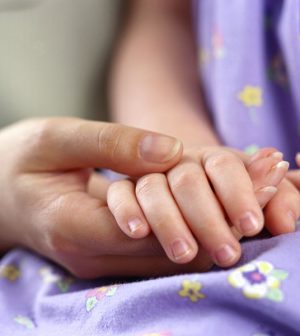- Could Your Grocery Store Meat Be Causing Recurring UTIs?
- Are You Making This Expensive Thermostat Error This Winter?
- Recognizing the Signs of Hypothyroidism
- 10 Strategies to Overcome Insomnia
- Could Artificial Sweeteners Be Aging the Brain Faster?
- Techniques for Soothing Your Nervous System
- Does the Water in Your House Smell Funny? Here’s Why
- Can a Daily Dose of Apple Cider Vinegar Actually Aid Weight Loss?
- 6 Health Beverages That Can Actually Spike Your Blood Sugar
- Treatment Options for Social Anxiety Disorder
Coping With Diabetes Is a Family Affair

When Giuseppina Miller’s 8-year-old son, Peter, was first diagnosed with type 1 diabetes, he necessarily got a lot of his parents’ attention.
“We tried to adjust pretty well, but I was getting no sleep because I had to check his blood sugar in the middle of the night, and I was worried all the time. My two younger daughters felt the stress and ended up getting ignored a little bit,” Miller said.
The young girls — just 7 and 5 at the time — struggled to understand why their brother suddenly garnered so much parental attention, and one day Miller overheard the girls teasing their brother about his diabetes.
“They didn’t really understand, so I thought it might help if they lived a day like he did. I had them eat like he did. And, at the time, he had a very strict diet because of the type of insulin he was taking,” Miller said.
“I also made them prick their fingers when he had to test his blood sugar. Obviously, they couldn’t do insulin injections, but living like him for the day taught them what he had to deal with,” she said. “It helped them understand.”
Like Miller’s daughters, many people struggle to understand what life is really like for someone living with diabetes — whether it’s a diagnosis of type 1 or type 2 diabetes.
William Polonsky, president of the Behavioral Diabetes Institute, said, “So many adults have said to me, ‘The day I was diagnosed with diabetes, people started acting like I lost IQ points. They started speaking slower and louder, and were telling me what to do.'”
Polonsky said that people may assume that you have diabetes because of something you did. “There’s a subtle form of blame and shame associated with diabetes. As if the fact that you have diabetes, or if you’re not managing it perfectly, it may be due to your own personal failing,” he explained.
When family or friends offer unsolicited advice, it’s typically because they’re concerned and are trying to be helpful. Yet, instead of asking how they could best help a person with diabetes, people often just “take their best guess,” Polonsky noted.
These folks often wildly miss the mark. A common complaint is that loved ones act like the “diabetes police.” They may ask: Do you need to check your blood sugar? Why is your blood sugar so high? Should you really be eating that food? Have you tried the latest diabetes “cure” I saw on the internet?
A better approach is to simply ask the person with diabetes how you can help them, Polonsky advised.
“Say ‘Hey, it looks like living with diabetes is hard. How can I help you?'” he suggested.
Or, if you see that someone you love with diabetes needs to make healthier lifestyle choices, offer to join them as opposed to telling them what to do. For example, ask them if they want to exercise with you.
Paula Trief, a professor of psychiatry and behavioral sciences at SUNY Upstate Medical University in Syracuse, N.Y., said a “we’re in this together” attitude may help the person with diabetes and their partner.
Whatever type of diabetes a person has, “there’s a fair amount of anxiety about what the future holds, and a fear of complications,” Trief said.
But, when partners collaborate, it can help reduce the anxiety.
Trief and her colleagues recently published a study in the journal Diabetic Medicine that found when partners of people with diabetes were involved in diabetes education, they had less distress about diabetes and felt better about their relationship overall. And, the people with diabetes had a slight improvement in their blood sugar control when their partner took part in their diabetes education.
Plus, it’s a cost-effective intervention, she noted. “It doesn’t cost any more financially if a partner comes to a doctor visit with you,” Trief said.
What if you’re the person with diabetes being bugged by the diabetes police? “Don’t talk to anyone in that moment when you’re angry,” Polonsky said. “Find a dispassionate moment, and say, ‘I know you want to be helpful. Can I give you a couple of ways that could help me, such as pick up a lunch for me if I forget mine or go for a walk with me?'”
Miller said that diabetes definitely affects all of your relationships — siblings, spouses, grandparents, friends — in some way.
“It’s one of those things you can’t really understand unless you’ve lived it,” she explained. “It’s like when you have a baby, until you have a baby, you just don’t get it. Like everything else in life though, everyone handles it differently. Try to respect everyone’s different strengths and weaknesses.”
More information
Read more about getting helpful support from family and friends from the Joslin Diabetes Center.
Source: HealthDay
Copyright © 2026 HealthDay. All rights reserved.










